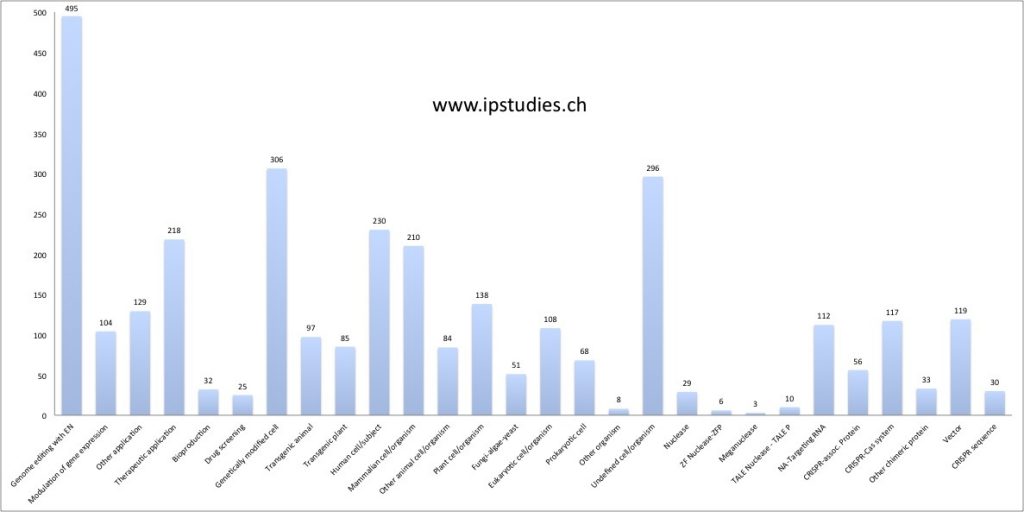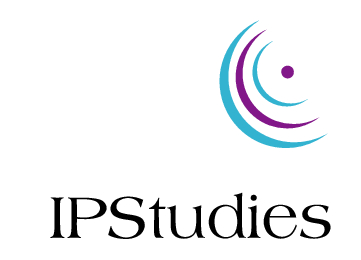The CRISPR technology has a wide range of target applications, from agronomy to medicine. As we celebrate the 2nd birthday of CRISPR patent analytics services at IPStudies and the 4th year of the CRISPR-Cas9 invention, a few application areas show an increasing competitive activity in the landscape. On CAR-T (chimeric antigen receptor T) cell immunotherapy, we now find more than twenty patent applications in the CRISPR landscape. As could be expected from their marketing/communication, a number of pharmaceutical players and CRISPR technology development pioneers have actively positioned their IP in that domain, namely:
Tag: patent
CRISPR patent analytics – April 2016 update
For the first quarter of 2016, we have added another 105 patent families to our CRISPR patent monitoring set. The CRISPR patent landscape keeps on growing steadily, with on average one new CRISPR patent family publication every day.
Our updated claim coverage analysis confirms the trends and facts we’ve reported in our detailed January 2016 patent landscape. 
Less licensing deals have been announced in the past few months, as the whole industry is watching for USPTO updates on the PTAB interference between two of the pioneering patent filings. More qualitative financial analysts are also now monitoring the outcome of this dispute, after the first successful CRISPR IPO (NASDAQ:EDIT) by Editas, a licensee of the pioneering Broad Institute patents, and the early April announcement of its own IPO filing by rival Intellia, a licensee of the pioneering University of California patent. In Europe, the CRISPR patent landscape is just as uncertain, with multiple (many anonymous – “strawman”) oppositions filed on the first granted patents.
While the uncertainty surrounding the licensing of the core technology patents is getting most media and business attention currently, the next rounds are already taking shape behind this main scene, with near 600 silent patent families claiming their own exclusive share of technology improvements, design-around attempts, and a myriad of specific application developments. There will be further disputes, settlements, and maybe even patent pools in the CRISPR era. The whole data is there, in multiple patent offices and databases – at IPStudies, we search, retrieve, sort and classify this data set to facilitate the CRISPR technology and competition watch for our customers: for more information on our patent landscape and patent monitoring services, check our CRISPR patent analytics offering or send us your inquiry through our contact form.
10 facts from the January 2016 CRISPR patent landscape
Our quarterly CRISPR patent landscape is now available. For this first release in 2016, we have included the latest business and technology developments, such as licensing deals information and a fully revisited breakdown of the functional and technical claim coverage. Our genomics expert Dr. Fabien Palazzoli has identified 489 CRISPR patent families out from worlwide patent registers, and systematically reviewed them down to individual claim wording to classify them into our unique, worldwide, independent CRISPR patent database.
In the meanwhile, facts and opinion papers around the Broad-Berkeley USPTO patent interference have been overloading our news monitoring capacity in the past 4 weeks… but that’s just about 2 pioneering families in the whole landscape. Here are 10 new facts out of the latest IPStudies CRISPR patent analytics – 489 CRISPR patent families as of January 2016:
Genome editing applications – Brussels – Feb 3-4, 2016
IPStudies will be attending the next Genome Editing Applications event in Brussels, now postponed to 3 – 4 February 2016.
A number of companies identified in our CRISPR patent landscape will be speaking there, such as CRISPR Therapeutics (TJ Cradick), Cellectis (Philippe Duchateau), AstraZeneca (Lorenz Mayr), Janssen R&D (Ines Royaux), Novartis (Anett Ritter), Cellecta (Paul Diehl), Merck & Co (Myung Shin), Precision Biosciences (Victor Bartsevitch), as well as instutional applicants such as the Technical University of Denmark, the Netherlands Cancer Institute, Duke University, Wellcome Trust Sanger Institute, and Royal Holloway-University of London.
The event also features a dedicated, interactive evening seminar, discussion and dinner on Intellectual Property and Business Strategy Landscape of Genome Editing Technologies, to be lead by Dr. Philip Webber from Dehns (UK Patent and Trade Mark Attorneys). More information can be found here.
For those attending, we invite you to take this opportunity to meet our head of biotech IP analytics, Dr. Fabien Palazzoli – ask a demo of our interactive CRISPR patent landscape for genome editing R&D/IP positioning! Our free sample can be downloaded here.
US inventor veterans at Intellectual Ventures are inventing around CRISPR gene editing
As both patent analysts and strategists, we like to look into the “weak signals” hidden behind the main trends of our landscapes, such as emerging design around solutions, original applications and new unexpected players entering the field.
In our latest update of our CRISPR patent landscape, we were surprised to discover a PCT patent application from a couple of senior inventors from Nathan Myhrvold’s team at Intellectual Ventures.
Continue reading
IP management practices – How early inventor collaboration can help faster granting at USPTO
In the CRISPR-CAS patent landscape, the file history of US patent 8’697’359 by Dr. Feng Zhang from the Broad Institute highlights how a “get this one granted fast” IP strategy can be enforced in IP management practice with a strong collaboration from the inventors, at least in the USPTO prosecution, and especially in a research field where a large part of the prior art is academic.
IP management practices – Findings from the CRISPR-Cas landscape
When initially building our CRISPR-Cas patent landscape database over this summer, we were surprised by some unusual inventor patterns. As we now monitoring deeper into this data subset for our customers, we are further amazed by how some inventors and applicants are already strongly defending their IP position by various means in the diversity of international patent prosecution law practices – an IP management lesson of its own!
TAL Effectors and CRISPR-Cas patent survey
We’re pleased the announce the availability of new IPStudies patent landscapes on TAL Effectors and CRISPR-CAS, two outstanding and competing genome engineering technologies that have raised significant investments in academic as well as industrial research in the past 5 years.
Our TAL Effectors and CRISPR-Cas patent landscapes analyze worldwide published patent families regarding:
- Transcription Activator-Like effectors (TAL Effectors – TALE), including genome editing methods based on TALE Nucleases (TALEN);
- Clustered Regularly Interspaced Short Palindromic Repeat (CRISPR), including genome editing methods based on the emerging CRISPR-Cas9 systems breakthrough technology.
The survey comprises:
- a global patent database (265 patent families) comprising both TAL Effectors and CRISPR, in order to give an overall overview of the IP situation, including the comparison of patent filings and the technological positioning of actors on either TAL Effectors or CRISPR or both;
- a focus on TALE Effectors (197 patent families), including TALE Nucleases;
- a focus on CRISPR (96 patent families), including CRISPR-Cas9 nucleases.
For more information, survey sample and order form, please check our dedicated page here.
Can patent indicators predict company valuation? A review of recent findings
One of the newest and most promising areas in econometrics research focuses on the valuation of companies based on their patent stock. This work, initiated by Hall’s observations regarding the correlation between patent citations and a company stock value, has blossomed in the past 5 years. Here is a review of recent findings.
